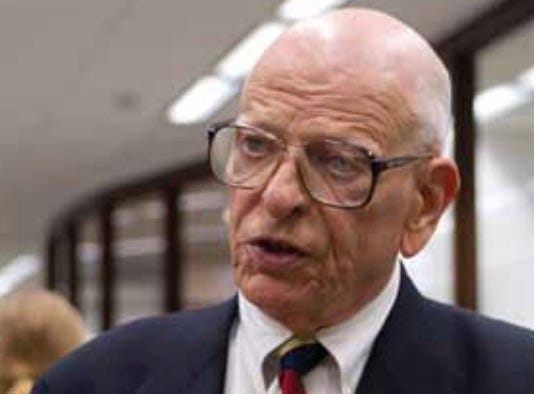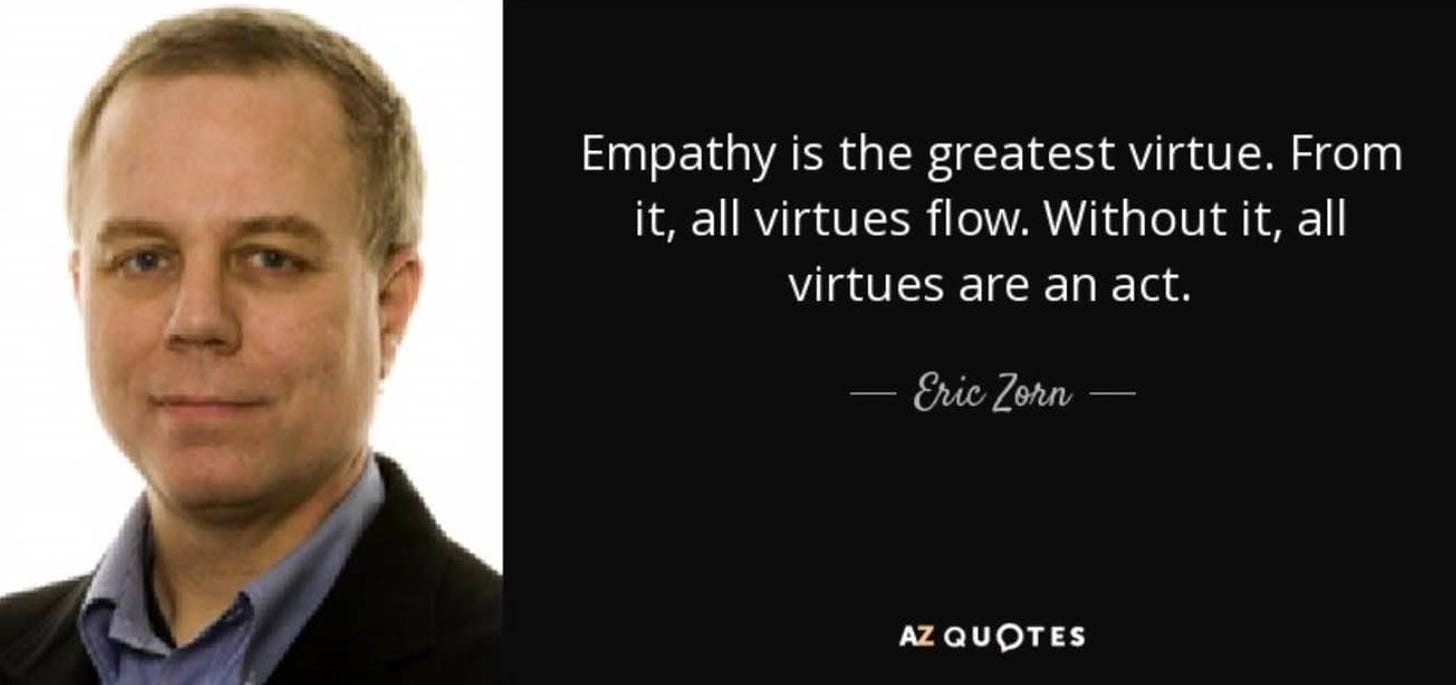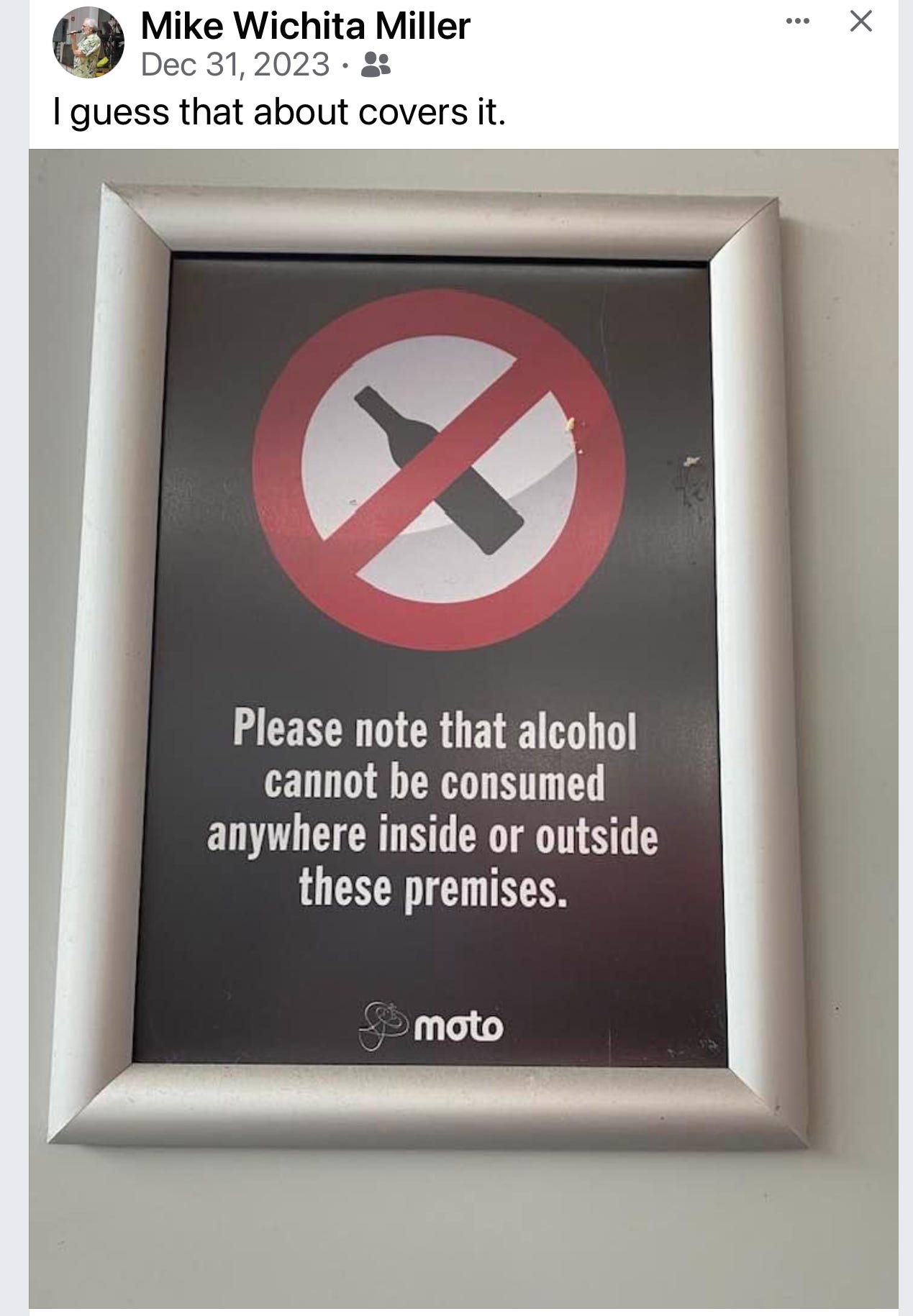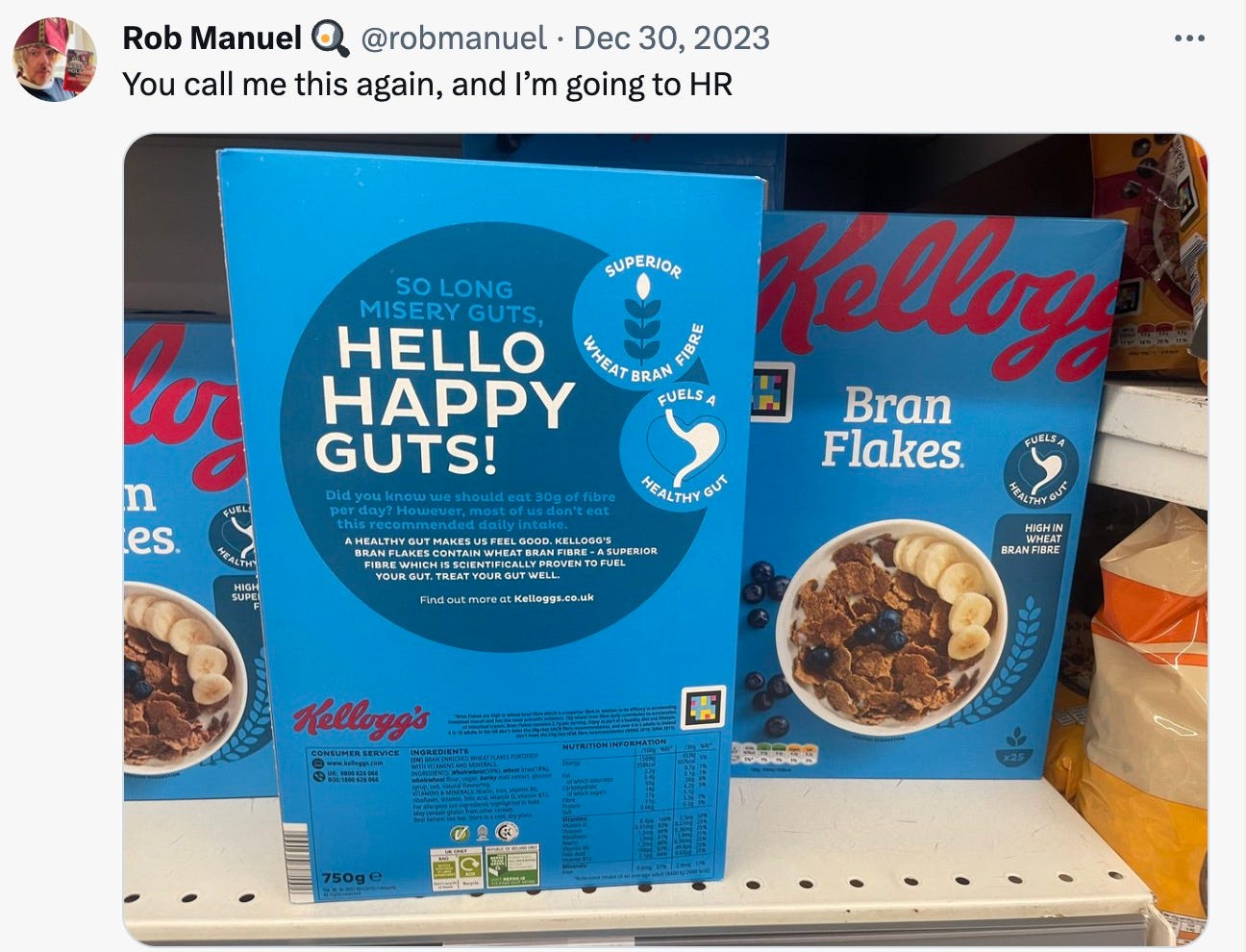The newsletter of virtues
A tribute to a recently deceased benefactor of folk music, and a discussion of how we should rank virtues
To read this issue in your browser, click on the headline above.
Eric Zorn is a former opinion columnist for the Chicago Tribune. Find a longer bio and contact information here. This issue exceeds in size the maximum length for a standard email. To read the entire issue in your browser, click on the headline link above. Paid subscribers receive each Picayune Plus in their email inbox each Tuesday, are part of our civil and productive commenting community and enjoy the sublime satisfaction of supporting this enterprise.
Tuesdays at 11:30 a.m. I talk with WGN-AM 720 host John Williams about what’s making news and likely to be grist for the PS mill. The WGN listen-live link is here.
Another holiday deadline, so another abbreviated issue. Most of my day Monday was spent hosting a New Year’s brunch for our kids who still live in town and then bracing myself for and watching the Rose Bowl. It was the kind of game Michigan has typically lost in recent decades, but, oh, my what a comeback.
I’ll be driving over to Ann Arbor to watch Monday’s championship game with my dad, who started taking me to Michigan Stadium when I was 5. The ability of sports teams to create or reinforce bonds of family and friendship and to bridge other divides is under-heralded.
Here’s a little dose of good sportsmanship from Alabama’s Tyler Booker.
A tribute to a now formerly anonymous donor
On WFMT-FM’s “Folkstage” program Saturday night — a live musical tribute to Steve Goodman — former host Rich Warren read the following:
While you are not familiar with the name Philip M. Burno, we would not be here this evening without him.
He was the soul and spirit behind the Anonymous Family Foundation, which as funded folk music programming on WFMT for over 27 years.
Phil Burno approached me at an Old Town School of Folk Music concert we were broadcasting live in the mid-1990s. He hand me his business card on which he had written: "How can I help you broadcast more events like this?"
We arranged a lunch with Dan Schmidt, then WFMT's General Manager.
Phil asked how much it would cost to being a regular live concert series. Dan Schmidt guessed at a number to which Phil immediately agreed.
Thus, the in-studio "Folkstage" series was born. Over the years, Phil funded WFMT folk projects large and small as well as financing my attendance at folk music conferences.
He also started an endowment for "The Midnight Special” (the recorded Saturday night eclectic music and comedy show on WFMT Warren also hosted for more than 20 years).
Phil was a proud ex-Marine who fought in Korea.
I once mentioned to him that I was reluctant to play Tom Lehrer's "Send the Marines" because I thought he might be offended by it.
He replied: "I fought in the Marines so you could play that and everything else."
He was a friend and supporter to all who love folk music and freedom of speech.
Phil died at age 91 on December 21. He had become a good friend. I always will miss him.
The tribute show, hosted by Marilyn Rea Beyer, current host of “Folkstage” and “The Midnight Special,” and featuring an all-star cast of local musicians, will be revived Friday night at Fitzgerald’s Pub in Berwyn.
Notes and comments from readers — lightly edited — along with my responses
Lots of great letters and comments in the last few weeks and the holidays have made it hard for me to curate them. I do want to share this one, though:
Charlie P. — I have a new credit card and want to keep my paid subscription to the Picayune Sentinel current. How do I do that?
Zorn — First, thanks for supporting the Picayune Sentinel. You are among those who keep this publication going.
Substack has a good help page to consult for questions and problems like this, but here’s your answer.
Log in to your Substack home page at Substack.com
Click your profile icon in the upper right hand corner, then scroll down to the settings option. From there, scroll down to “subscriptions.” There you will find the Picayune Sentinel and other publications you subscribe to, paid and unpaid.
Click on the “greater than” symbol to the right of the name of Picayune Sentinel. That will take you to “manage your subscription,” where of the options will be “update your payment information.”
If you’d rather watch a video tutorial, this one is short and to the point:
The post of virtues
I ran across this while doing some file archeology:
It comes from “50 things I learned in my first 50 years,” a 2008 column. Last week I posted this image to Facebook and added, “Am I wrong? I might be. If I am, what is the greatest virtue?
Here is a sampling of the responses:
Michael Burke: Socrates taught, “Virtue is knowledge,” and Plato taught, “The highest form of knowledge is empathy, for it requires us to suspend our egos and live in another’s world.”
Brian Becharas: In his Nicomachean Ethics, Aristotle discusses virtues, both moral and intellectual. He argues that one virtue rises above all the others: wisdom. Unlike other virtues, it's an end in itself and, thus, the best way to achieve happiness—the goal of life." Methinks all of the above (herewith) are virtuous!
Michael Miner: Is empathy too innate to be a virtue? Empathy can be a plague, because whenever not acted on — which often it cannot be — it causes shame. If a virtue is something achieved, then generosity might be — when not the most pretentious of virtues — the greatest, for it requires observation and the willed suspension of selfishness. If that is an act, it is also willing ourselves to be what we weren’t born to be. That’s what we call character.
Gaye Harrison: Right! It’s the first acknowledgment that we are not the center of our universe, and that we’re here to do good for all
Chris Stacey: You need a combination of virtues. Truth seeking, justice and mercy. Mercy incorporates empathy. Ranking one virtue can risks, ironically, evil deeds. Of course St Paul may beg to differ! The greatest of these is love.” Great thought experiment.
Warren Silver: With all due respect to St. Paul, love without empathy is not very loving.
Pete Prokopowicz: I would go with love, as in love your enemies. That virtue separates the everyday OK person from the saints. I can only think of a handful of such people. Tolerance would be close behind; and achievable.
Leigh Chethik: How about compassion? Empathy plus
Chad Leverenz: Upper-body strength is at least #2
Diane Kaercher: Kindness. One can be kind without being empathetic. It’s a greater virtue because it’s harder to be kind when having no empathy, but it is possible.
Pat Mahaffee Gingrich: Virtue without serial forgiveness is hollow.
Rebecca Ann: Empathy yes, but also learning. As in, know better, do better. One stems from the other, I'm sure.
Phillip Seeberg: I took the Gallup Strengths finder assessment and I rank low for empathy. I am high in responsibility, so I believe I help others out of responsibility rather than empathy. But it helps me, because I know some empathetic people who feel too much. I’m better able to visit with a dying person because I don’t get all broken up.
Steve Roess: I've seen quite a few people who say they have empathy but they never seem to demonstrate it, or worse, they display the opposite, especially when interacting with people with whom they disagree. So as with a number of other commentators, I'll go with kindness.
Michelle Buck: I've seen quotes from Aristotle, Churchill and Maya Angelou saying that courage is the greatest virtue, because without it you can't practice other virtues. I'm big on the importance of courage, and I also think empathy is extraordinarily important.
Bob Schneider: Why is it everything has to be ranked in lesser or greater? I spent a lot of time overseas, and foreigners scratch their heads that we pit everything against everything else. When it comes to virtue, there is no greater or lesser, there is goodness, and that is enough.
Richard Andrewski: “Evil, I think, is the Absence of Empathy,” Captain G. M. Gilbert after the Nuremberg trials. His appointment was as the prison psychologist of German prisoners. During the process of the Nuremberg trials, he became a confidant to several of the defendants, including Hermann Göring.
Mark Komissarouk: I'd say appreciation - valuing the people and the world around us, not dismissing or writing anything off. Empathy is related and is important, but can have real downsides: See “The Good and Bad of Empathy” a 2017 article in the Scientific American.
Bruce Weber: The ability to hit with men on base.
Charles Gradle: “You never really understand a person until you consider things from his point of view... Until you climb inside of his skin and walk around in it.” Atticus Finch. This is empathy that’s based on understanding.
Monica Muhs: Do you have a problem with being wrong, or do you always have to be right? Or maybe, do you need people to tell you that you are right?
Responses:
To Monica: No I’m pretty used to being wrong. See last week’s rundown of my mostly bum predictions for 2023.
To Bob Schneider: All ranking assertions and articles and charticles are attempts to provoke thoughtful conversations, disagreements, reflections. Do we have to do that? Of course not.
To Mark Komissarouk: Thanks for the Scientific American link. Here’s a bit from that article':
Neuroscientific investigation has led most scientists to see empathy as an umbrella term covering three main components. Emotional empathy—sharing another's feelings and matching that person's behavioral states (feeling afraid, for instance, when someone else is on a tightrope)—is a biological response found in many different species that evolved in the context of parental care and group living. Cognitive empathy, also called perspective taking or theory of mind, is the capacity to think about and understand another's feelings. And empathetic concern, or compassion, adds the motivation to do something about another's suffering. Taken together, these components are fundamental elements of our social lives. …
Varied definitions occupy the center of recent public debates about empathy, spurred mostly by the publication last year of Yale University psychologist Paul Bloom's book Against Empathy. Bloom devoted a lot of space to specifying which empathy he does not like: cognitive empathy is fine, but he views emotional empathy as a poor basis for moral behavior, arguing that “we’re better off without it.” We can't get rid of emotional empathy—but Bloom has a point. Empathy is not always good. Frimatologist Frans B. M. de Waal of Emory University acknowledged, in a 2009 book, that there is “no obligatory connection between empathy and kindness.” In some situations, empathy causes emotional distress, and it is naturally biased toward those closest to us and away from others.
Ya gotta see these tweets!
Here are some funny visual images I've come across recently on social media. Enjoy, then evaluate:
Vote for your favorite. I’ll share the winner in Thursday’s main edition.
Usage note: To me, “tweet” has become a generic term for a short post on social media.
There’s still time to vote in the conventional Tweet of the Week poll!
Thank you for supporting the Picayune Sentinel. To help this publication grow, please consider spreading the word to friends, family, associates, neighbors and agreeable strangers.
.


















My daughter is a nurse and has displayed what’s called “cognitive empathy” ( she is very easily able to understand how others feel) since she was very young and a high degree of empathetic concern ( she is motivated to relieve others suffering). She doesn’t however have high emotional empathy (she doesn’t herself match the feelings of others). This is I believe this combination is as the articles listed above note a better combination the those with high emotional empathy….at least for a nurse.
Here’s a story I tell about her at age 4 where these are to some degree displayed :
I am watching my daughter and her preschool friend play the simple board game Chutes and Ladders. And I realize my daughter is clearly cheating …..to lose. After her friend “ Janie” leaves I ask my daughter “ Were you cheating in order to lose?” And my daughter says “ Yeah. It just makes Janie so so happy when she wins and so sad when she loses” And I told her that was very nice of her. And my kid sort of rolls her eyes and says “I mean it’s Chutes and Ladders, who cares?”
I believe they prefer to be called "former Marines", not ex-Marines.